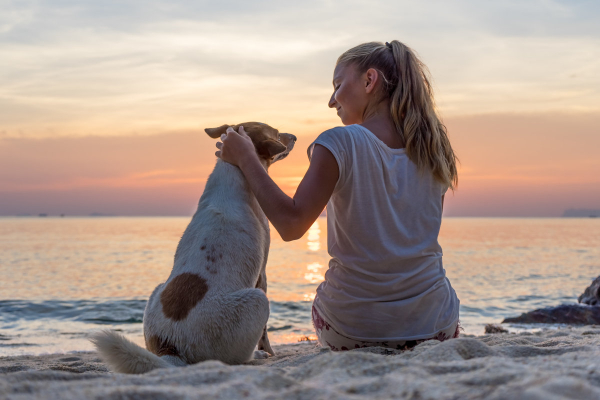Pet loss support, such as pet loss support groups, can bring a measure of peace and comfort after the heartbreaking loss of a beloved pet. To help you understand the different options and find the ones that are right for you, integrative veterinarian Dr. Julie Buzby invited end-of-life-care veterinarian Dr. Dawnetta Woodruff to share some of her favorite pet loss resources.

Our beloved pets are a treasured part of our lives and cherished members of the family. We spend so much time with them, and they give us the incredible gifts of true companionship and unconditional love! This human-animal bond is a big part of why we love our animal friends so much, and why it hurts so badly to say goodbye.
As pet owners, we never know exactly how many years we will be blessed to share together. A dog’s average lifespan is 10-13 years, while a cat on average will live for 13-17 years. But this can vary tremendously based on breed, genetics, and life circumstances.
However, what we do know for sure is that our pets’ lives are much too short, especially in comparison with most of our human loved ones. Experience has taught us that the years will pass quickly—so we do our best to soak up all of the joy and love that those precious years can hold!
Anticipatory grief surrounding pet loss
As our pets age, we may find our small dogs and cats curl up on our lap more. Or our large dogs may want to spend more time snuggled up beside us. Those moments are special indeed! However, they can be bittersweet as we realize that age is taking its toll.
The chronic health conditions that accompany growing old, such as cancer, kidney failure in dogs, liver disease in dogs, and heart disease in dogs can be difficult to manage. And when our pets are dealing with these things, we may begin to fear the inevitable decisions that loom on the horizon.
This overwhelming feeling is known as anticipatory grief. And it can be just as challenging and consuming as the grief that happens after a pet dies. Preparing for your dog’s euthanasia is heartbreaking in its own way.
Grieving looks different for every person, and that’s ok
The grieving process often starts before your pet passes and continues for weeks, months, or even years after the loss of a pet. Unfortunately, some people will expect you to “get over it” quickly. Or they may forget that you endured a loss at all.

Also, well-meaning friends or family members may tell you that there are stages to grief, and once you go through them all, you’re done and you can move on. This sounds good in theory. But the reality is that there is no specific order, timeline, or recipe for how to move through your own grief journey. Each time you go through grief, the process will look different, and the time frame will change.
You may feel numb for a while, as if you are not grieving at all. Or, you may feel many of the stages of grief at once, and this is also ok. Shock, denial, anger, bargaining, depression, and acceptance will each ebb and flow. Some days may feel easier and you can focus on the joy you shared with your sweet dog. But others can feel almost impossible, and the memories of your precious kitty bring a rush of tears.
The love you shared with your pet changed your life for the better! It is understandable to not feel ok when that beloved animal is no longer physically with you. And it is ok to grieve differently for each pet that is a part of your life. You love every pet deeply, but as in our relationships with people, some bonds are extra special. Those relationships may make grief feel bigger, or more challenging.
Finding pet loss support through connection with others
So what do we do when grief rears its head? The biggest thing to realize is that it is ok to reach out for help. Grief can feel isolating and lonely, but in reality, pet loss is a common experience. And many people can empathize with you and offer support. Find those friends, family members, and coworkers who adore their pets, and take a moment to talk. Knowing that you are not alone can be uplifting and reassuring.
Sharing memories of your pet with those trusted people in your life who understand the depth of the love you shared can be so helpful. Maybe you want to post an album of photos online, make a video tribute, create a memorial in your garden, or choose a different dog memorial idea. All of these are great ways to remember and grieve a beloved companion animal.
If there are people in your life who do not understand your grief, or who say things that minimize your feelings, it is ok to hold back and share less with them for a time. Protecting your feelings is a valid way to honor the love you have for your animal family. And giving yourself a protected space to grieve (physically and mentally) is important for your own mental health.
Options for pet loss support
There are many resources for coping with pet loss. So at times finding the right one can be overwhelming. Grief counselors, pet loss support groups, websites, books, and online chat rooms are all valid and helpful. But not every option will be right for every person or situation.
Let’s take a look at some of the different pet loss support resources.
Pet loss support websites
You might start your search for help online. There are a lot of websites that offer guidance, understanding, and reassurance. This is a good place to begin your pet loss journey if you would like to read from the privacy of your own home rather than talking to others or setting up a one-on-one grief counseling session.
You may feel less alone when you see how many resources are available through a quick online search. One of my favorite sites that is full of helpful resources is the APLB (Association for Pet Loss and Bereavement). However, there are other great sites out there too.

Pet loss books and pet loss support products
Others may prefer to read a book or use a pet loss support product. There are a myriad of options in this category because there is no one book or product that will work well for everyone. What may have helped your neighbor may not seem very comforting to you. And the book you love may not resonate with your best friend.
It is often best to look through the books available, find a title that speaks to you, and then look at its summary and reviews. In doing so, you may be able to tell if it is the type of grief support you are looking for.
My favorite pet loss book that seems to resonate with many (if not most) people, is When Your Pet Dies: A Guide to Mourning, Remembering, and Healing by Alan D. Wolfelt, PhD. It is full of practical and helpful advice, and you can read it one section at a time. You can even pick and choose the sections that seem most applicable to you and your family.
For some people, sitting down to read a book is just what they need. But for others, the task may be a bit overwhelming. In that case, it may be easier to have a targeted task or helpful thought for the day. This is where websites that have pet loss affirmations, such as the pet illness and coping tools from CCM Counseling LLC., can be useful.
Or you may wish to purchase a product like the Rainbow Bridge Pet Loss Deck, which includes 52 cards with exercises and healing tools specific to pet loss. These types of products offer tangible coping strategies to guide you through grief after the loss of a pet.
Grief counselors
In some cases, books and online resources simply aren’t adequate to help you through the enormity of your grief. If you find yourself struggling more than you expected, or if your grief feels overwhelming, you may benefit from individualized professional counseling. If you already have a trusted therapist, setting up a session with him or her may be a good place to start.
However, some mental health professionals do not have experience with pet loss themselves. Therefore, it may be most helpful to find a counselor or therapist who is trained specifically to help with grieving the loss of a pet. Often these professionals are also animal lovers who have experienced pet loss themselves. So they understand the depth of your grief on a personal (as well as a professional) level.
You may wish to ask your veterinarian if he or she has a list of trusted local pet loss counselors. Or, you may find one online who offers pet loss sessions remotely, through a telehealth session.
Pet loss support groups (virtual or in-person)
Yet another option for coping with the loss of a pet is a pet loss support group. These sessions are typically guided by a pet loss professional, and they give you a chance to meet other people who are seeking support.
The groups may be in-person if they are hosted locally. Or they may be set up for virtual attendance online. Some veterinary clinics or crematory providers offer in-person support groups, but not every area has a local option.
If you cannot find something locally, or if you prefer online attendance, there are a few national groups that offer virtual pet loss sessions. One such group is The Human-Animal Bond Trust, which offers free-of-charge pet loss support groups.

Pet loss support chat rooms and social media sites
Another option for support is an online chat room. Social media has the potential to be a very supportive place. But it can also be intimidating to post about your grief on your own social media profiles. After all, there are many people who have not experienced pet loss, or who do not view their pets as family members.
Finding a group of like-minded people can be a more focused way to get the support you need. And the interactive format of social media can be helpful for people who desire to share feelings in real-time with other people who have also experienced pet loss.
Keep in mind, though, that some of the informal support groups are not well monitored. And the people offering you advice do not always have training in grief counseling. You may find their advice to be a tremendous help, or you may find that the group’s lack of organization is difficult. As we have said before, no one option is going to be the best fit for everyone.
Pet loss support hotlines (voice or text)
One final avenue of support is via telephone. Nationally, the United States has a Crisis Text Line that is available from anywhere in the US, any time, about any type of crisis. You can text HOME to 741741 to get started. This support is not pet-loss focused, but it may still be helpful for you due to its anonymity and accessibility.
Many schools of veterinary medicine and veterinary medical organizations also offer a pet loss hotline as a resource for grieving families. These hotlines are typically focused on companioning rather than professional support. You will often speak with a volunteer or a veterinary student who has an interest in supporting families through the process of grief. If you simply need a compassionate, listening ear, this could be the right option for you.
Some pet-specific hotlines are listed below. Keep in mind, though, that unlike the crisis text line, these hotlines do have more limited hours.
- Tufts University Pet Loss Support Hotline: 508-839-7966
- Cornell University Pet Loss Support Hotline: 607-218-7457
- UC Davis School of Veterinary Medicine Pet Loss Support Hotline: 800-565-1526
- CVMA Pet Loss Helpline: 630-325-1600
- CARE Pet Loss Support Hotline: (877) 394-CARE (2273)
- Virginia-Maryland College of Veterinary Medicine Pet Loss Support Line: 540-231-8038
Take advantage of pet loss support resources
No matter which support option you choose to help you through pet loss grief, the important thing is to feel comfortable seeking help. Pets are amazing creatures with beautiful souls. And it is natural for us to feel a profound sense of loss in their absence. Understanding the process of grief, and allowing yourself to acknowledge its difficulty are important steps towards healing your heart.
You will never fully be the same, and you will never fully “get over” such a huge loss. However, as you focus on healing, the days will begin to feel a bit easier. And the joy will feel brighter again as you remember your sweet pet’s life.
You will learn to walk with grief as a part of your heart, and you will be able to focus on and appreciate the profound beauty your pet brought to your life. They loved you deeply, too, and they would want you to take care of yourself in their absence.
Which pet loss support resources did you find most helpful?
Please share below to help other grieving pet parents.


Losing a pet is incredibly painful, and seeking support can help ease the grief. Pet loss support groups offer comfort and understanding from others who share similar experiences. Resources like hotlines, online forums, and counseling services also provide valuable support. Connecting with others can promote healing during this difficult time.
Hi Sadie,
This is very true! Thanks for offering your support and advice.